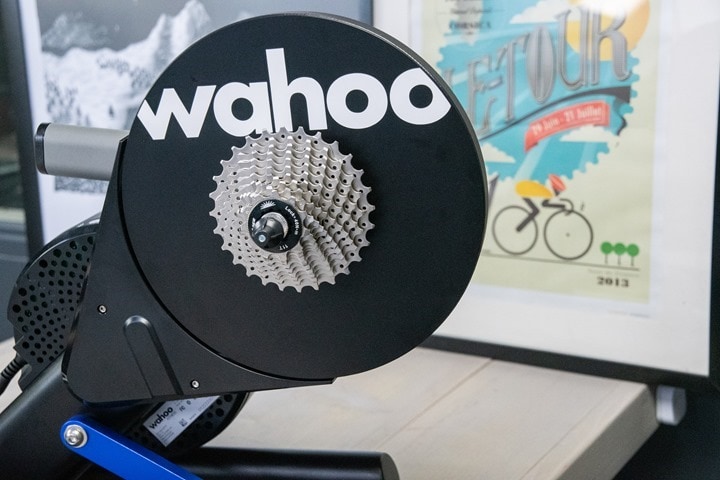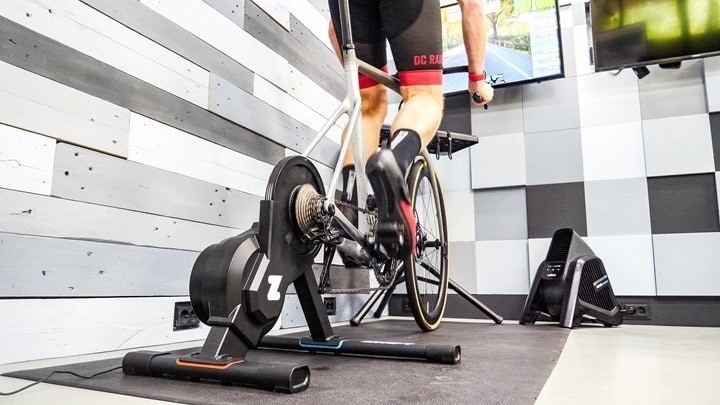Exactly one year ago today, Zwift announced the Zwift Hub smart trainer – which priced at $499USD, immediately lit a fire across the rest of the smart trainer industry. The product was mostly a rebrand of the existing JetBlack VOLT smart trainer, which had been around for a few years in various versions, yet with far more limited marketing reach than Zwift itself. While aforementioned fire was great for consumers, it was less ideal for smart trainer companies and their profits. And in the case of Wahoo Fitness, they ultimately ended up announcing a patent infringement lawsuit against both Zwift and JetBlack a month later once the Zwift Hub actually became available to purchase. Wahoo dropped the JetBlack suit a month after that, instead focusing on Zwift.
That Zwift-focused lawsuit has now been dismissed, following nearly a year of legal wrangling by both companies. I’ve posted extensively on the court filings that both companies made over the past year (well, until they started marking much of it as confidential). But the TLDR version is that after a series of volleys last winter, it culminated in an initial judgement last spring that served as a starting point for a longer jury-trial next summer (2024). While opinions differ on how exactly the judge ruled (you can read all the details here), the reality is it wasn’t super Wahoo favorable. The judge expressed significant concern with the validity of a number of Wahoo’s patents. But keep in mind this wasn’t up to the judge, they were instead ruling whether the case could go forward or not – and ultimately, it was granted to go forward. However, Wahoo did not receive the injunction relief they had hoped to receive, which was the main point of that court date.
Fast forward to now, and as of yesterday the judge has signed off on the lawsuit dismissal, and Wahoo has also filed documents with the US Patent and Trademark office regarding the state of the case. The lawsuit was dismissed “with prejudice” (which simply means it’s a final decision), and specifically that both sides would individually cover their own legal expenses/etc. Instead, the focus going forward would be on a licensing agreement and cooperation agreement, which I’ll outline below.
What Happens Now:

First up, let’s get the boring stuff out of the way first and at least include the official statement. Albeit, I had a call with both Wahoo and Zwift yesterday, where I’ll dive into the specifics down below. Here’s the official statement:
“Zwift and Wahoo Fitness today confirm the amicable settlement of all pending litigation. The agreement will see both parties embark on a renewed approach to collaboration, with a view to growing the indoor fitness category and delivering continual, ongoing improvements to customers – through increased innovation, ease of use and better value.
Wahoo has granted Zwift a limited licence to use its patents. Zwift will continue to sell its Zwift Hub smart trainer in existing ecommerce markets – US, UK and Europe.
In addition to selling Zwift Hub, Zwift will return to selling a selection of Wahoo smart trainers, bikes and accessories on Zwift.com from mid-September. The assorted range will offer customers a simple selection across a range of price points, all sold with one year of Zwift.
Wahoo Fitness will also offer customers the option to bundle one year of Zwift with the purchase of a smart trainer or bike via Wahoofitness.com.
Both parties look forward to sharing further details in the coming months.”
Ok, so let’s look at what’s happening and why it matters. The very first thing Zwift and Wahoo said on the conference call is that they basically wanted this behind them and that it was a distraction to both companies and more critically, consumers. They noted that they see this as the starting point for future collaborations on both “software and hardware”. Just for perspective, this was to my knowledge the first time ever since Zwift’s or Wahoo’s inception I’ve had a three-way conference call between them (Zwift/Wahoo/Me). I’ve had countless individual conference calls, but never one with both parties at once.
First up, Zwift is officially “licensing” these patents from Wahoo. Now, we don’t what they’ll pay on a per-unit/licensing statement. Meaning, that could be a penny, a dollar, ten dollars, etc… Obviously, neither Zwift or Wahoo are going to get into specifics there. Still, the thing to understand here is that while the internet at large probably assumes some big licensing payoffs are being made here, I doubt it. There’s a few reasons for that doubt, but one I’ll discuss for now is that neither company has a great legal to cost combination going forward. Meaning, from Wahoo’s side, a win was hardly certain (if not potentially unlikely). Meanwhile, from Zwift’s perspective, a loss would been devastating for their smart trainer plans (and potentially other hardware). However, more than that, both sides had hired very high-end law firms. Neither company picked budget legal teams, they both picked the best of the best out there. Now matter how many trainers either side sells, eventually your ROI on this flat-lines.
By Zwift and Wahoo agreeing to a confidential licensing fee, it preserves Wahoo’s patents (whereas a loss would open the floodgates to those patents being invalidated). Even if that licensing fee is a penny, it basically keeps those patents as-is, while saving both companies the hassle of another year of legal drama.
However, what’s happening next is more interesting. First, remember that in the past few days, Wahoo has dropped the price of the Wahoo KICKR CORE to $599. Then, effective September 13th, Zwift will resume selling Wahoo products on Zwift.com. Specifically, the following Wahoo products will appear:
- Wahoo KICKR CORE
- Wahoo KICKR
- Wahoo KICKR BIKE
- Wahoo KICKR DESK
- Wahoo KICKR CLIMB
- Wahoo KICKR HEADWIND
Next is the key bit. From that date (Sept 13th), Zwift will transition to ONLY selling trainers bundled with Zwift on Zwift.com, which will include one year of Zwift, but at a reduced price. Zwift will disclose said price on September 13th. So as an example, let’s take the Wahoo KICKR CORE. That trainer is now $599USD, but Zwift.com will only sell it in a Zwift inclusive bundle, which will be a higher price . Same goes for a Tacx trainer, or an Elite trainer, a smart bike, or whatever else. Inversely, on Wahoo Fitness, you’ll be able to get the same upsell deal too for a Zwift included bundle.
For those local bike shops, fear not, you can get the same deal there. They piece will go live in about a month, but essentially you’ll be able to purchase whatever trainer you want (e.g. Wahoo KICKR CORE for $599) at your local bike shop, and then you’ll get the ability to pay the extra amount for the Zwift 1-year membership (versus a normal Zwift monthly membership).
So what does this mean for the Zwift Hub price? Well, Zwift hasn’t announced any official price changes yet, but using their newly created policy of only selling bundled trainers from Sept 13th, it’s likely we’ll see the Zwift Hub price change to account for the inclusion of Zwift going forward.
Finally, I asked when Zwift and Wahoo started talking seriously about a settlement, and whether or not Wahoo buying themselves back from the banks this past spring change that equation. They said that didn’t really impact things, and that there had always been open lines of communication, but that things started getting serious in the last 4-5 months. Which, upon pulling out a calendar is basically right after the judge made their initial injunction ruling. Which in turn was when the trial date was set for more than a year later. Obviously, that’s a lot of lawyer fees to keep paid.
Going Forward:

So with all the financial bits out of the way, what else is changing. Well, on said threesome conference call, Zwift started out by noting that the “scope of the agreement [between Zwift and Wahoo] is much much broader [than the lawsuit dismissal]” and that “both companies wanted to return to the 2016-2017 period of cooperation.” By that, Zwift meant that they wanted to return to the pre-lawsuit days where Zwift and Wahoo were sharing information about upcoming hardware ahead of time to ensure smooth introductions/transitions for customers, as well as to allow new innovations to occur. For example, to ensure that when Wahoo announces something like Wahoo Direct Connect (Ethernet/WiFi connectivity) that Zwift is immediately ready to support it. Or vice versa, if Zwift announces some new software feature that Wahoo could implement on hardware (like when steering was announced), that Wahoo could be ready at launch.
Of course, as with some historical things, there may be a case of rose-tinted glasses here. While both companies were at least on talking terms back then, neither company actually liked each other at the executive level. There’s plenty of reasons for that, but the reality is that both of those technical items I mentioned above were hugely delayed on implementation. Now, some of that was driven by years of Zwift essentially ignoring their hardware partners (Wahoo/Tacx/Elite/Saris/etc…), with countless examples of them not even answering e-mails anymore from these companies. Based on my discussions more recently, that direction has seemed to change over the last year with some executive changes on the Zwift side.
Both Zwift and Wahoo say that the main focus going forward is going to be “on collaborations”, including specifically “on hardware and software”. One could see how perhaps Zwift will finally implement a gear shifting display for the KICKR Bike – something that Zwift themselves has accidentally leaked a few times in recent months.
Of course, one could also imagine that means a closer potential partnership on licensing more Wahoo hardware components/patents. I asked whether or not this changes their existing manufacturing partnership with JetBlack (for which the Zwift Hub is based on their JetBlack VOLT). Zwift noted specifically that “the main agreement is actually with PowerPlus, the manufacturer of the JetBlack trainer”, but then declined to talk about future hardware products. Of course, up till now, Zwift has been reasonably open about the relationship with JetBlack and how things came to be. Whether or not that changes in the future is anybody’s guess. Keep in mind that Zwift did take the firmware development for the Zwift Hub in-house, which is why we see the slight split between features on the Zwift and JetBlack variants, albeit most updates do seem to cross-pollinate eventually.
Finally – what does this means for their competitors? Honestly, it’s too soon to tell. If this signals a price increase of the Zwift Hub, then likely those competitors will be happy. Concurrently, consumers have also clearly benefited from the price decreases announced over the last week to both Wahoo and Elite trainers. And Zwift buyers would likely also benefit assuming a new bundled price is better than just buying the trainer+monthly subscription individually. Whereas if you were buying the Zwift Hub for use with another platform (e.g. TrainerRoad), then that’s probably not super ideal for those customers. But it’d be hard to blame Zwift for that.
With that – thanks for reading, and stay tuned for next week!



0 Commentaires